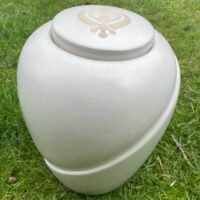Sikh Cremation
What happens at a Sikh funeral?
At the Gurdwara, the Sikh place of worship, on the morning of the funeral, loved ones may circulate around the body once for a final viewing and the Granthi, a ceremonial scholar of scriptures, will recite an Ardas, a daily rite of passage. The coffin is then taken to the crematorium hall where the congregation will stand for the Granthi to recite a Kirtan Sohaila; a song of praise or time for sleep, followed by an Ardas, permitting the cremation.
Do Sikhs use burial or cremation?
Sikh Cremation Ceremony
Following cremation, attendees return to the Gurdwara or the home of the family where the final readings of Guru Granth Sahib, the Sikh holy scriptures, are carried out by the Granthi.
Scattering Ashes on Water
In the UK, there are no strict laws on scattering ashes in water. We have an in-depth article that explains the laws and regulations for scattering ashes in water.
We are proud to offer a Sikh water urn for conducting an ashes ceremony on the water.
What do Sikhs do with ashes after cremation?
Sikhs will usually travel to Punjab to scatter the ashes of the deceased in Kiratpur Sahib Gurdwara in Rupnagar District, Punjab.
Kiratpur is a sacred place to the Sikhs as its foundation was laid and established by the Gurus.
Where must the ashes be scattered in Sikhism?
The ashes should be scattered in any living body of water for those who are unable to travel to Punjab, which is why there has been an increase in the number of Sikh ash scattering ceremonies in the UK.
Sikhism does not support the idea of raising monuments or placement stones at the crematorium site for their departed loved ones, nor do they believe in following any ritual such as lighting a lamp to guide the soul. It is customary to accept the death and continue to pray for the soul of the deceased.

Glossary
Gurdwara – the Sikh place of worship
Granthi – a ceremonial scholar of scriptures
Ardas – a daily rite of passage
Kirtan Sohaila – a song of praise or time for sleep
Guru Granth Sahib – the Sikh holy scriptures

